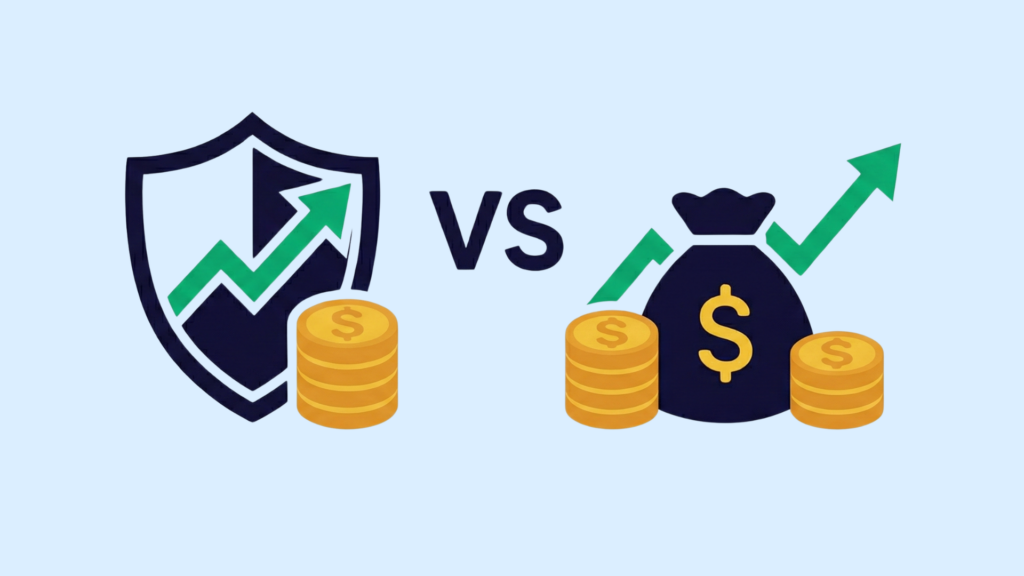Quick Summary:
– Liquid mutual funds are low-risk investment options that usually feature very high liquidity and designate investment in short-term debt instruments (for example: treasury bills and commercial papers).
– Liquid mutual funds offer wonderful advantages, including no entry/ exit loads, limited interest rate risk, daily NAV, quick redemption within 24 hours, and more.
– Liquid mutual funds are suitable for short-term objectives and are a better alternative to savings accounts due to higher returns.
– However, they have lower returns compared to other debt funds, and the dilemma about taxes incurred in the form of taxed dividends and capital gains is separate, depending on how long you hold on to your investment (For Deductions use Carried Interest).
– When choosing a liquid mutual fund, be mindful of the fund’s performance, expense ratio, and the experience of the fund manager.
What is a Liquid Mutual Fund?
Liquid mutual funds are a common choice for investors looking to park their money safely while maintaining easy access to their funds. These funds are ideal if you want to earn better returns than a savings account without compromising much on liquidity. But what exactly is a liquid mutual fund, and how does it work?
Definition of Liquid Mutual Funds
A liquid mutual fund is a kind of debt mutual fund that heavily invests in short-term debt instruments like treasury bills, commercial papers, and government securities. These instruments typically have a maturity period of up to 91 days.
The short duration of these investments allows liquid funds to offer both safety and liquidity to investors. This makes them an excellent option for those who need quick access to their money without sacrificing returns.
How Liquid Funds Work
Liquid mutual funds operate with a focus on capital preservation and easy access to money. When you invest in a liquid fund, your funds are pooled with those of other investors.
The fund manager then invests this collective pool in short-term, high-quality debt instruments that mature within 91 days. The short maturity period helps to reduce the risk of interest rate fluctuations, ensuring that your investment remains relatively stable.
Features of Liquid Mutual Funds
Liquid mutual funds offer several features that make them appealing to investors seeking a blend of safety and easy access to their money. Here’s a closer look at what sets these funds apart:
No Entry and Exit Loads
One of the significant advantages of liquid mutual funds is that they usually come with no entry or exit loads. This means you won’t incur additional charges when you invest or redeem your units. This feature makes liquid funds cost-effective for short-term investments, allowing you to keep more of your returns without worrying about extra fees.
Low-Interest Rate Risk
Liquid funds are known for having the lowest interest rate risk among debt funds. This is because they primarily invest in instruments with very short maturity periods—up to 91 days. Shorter maturities mean that liquid funds are less affected by fluctuations in interest rates compared to longer-term bonds. This reduced sensitivity to interest rate changes helps keep the value of the investment stable.
Daily NAV Calculation
A liquid mutual fund’s Net Asset Value (NAV) is calculated daily. This means you get a real-time snapshot of the fund’s value each day. Daily NAV calculations provide transparency and help investors track the performance of their investments with up-to-date information.
Quick Redemption
When you request to withdraw your money, liquid funds generally complete the transaction within 24 hours. This fast redemption process ensures that you have easy and timely access to your funds whenever needed, making liquid mutual funds a convenient option for managing short-term cash needs.
Advantages of Investing in Liquid Mutual Funds
Liquid mutual funds offer many benefits, making them an attractive option for short-term investment needs. Here’s why you might consider investing in them:
Lower Risks
Liquid mutual funds focus on preserving your principal and providing consistent returns. They invest in high-quality, short-term debt instruments, which help keep the fund’s value stable despite fluctuations in market interest rates. This low-risk profile makes them suitable for conservative investors looking to avoid the potential volatility of longer-term investments.
Flexibility
One key advantage of liquid funds is their flexibility. You can redeem your investment without penalties after just a few days. This flexibility is ideal if you need to access your money quickly, as it offers a convenient way to manage short-term cash needs without being locked into a long-term investment.
Better Returns Than Savings Accounts
Liquid mutual funds often provide higher returns compared to traditional savings accounts. While savings accounts offer low, fixed interest rates, liquid funds invest in short-term, high-quality debt securities that typically yield better returns. This makes them a more attractive option for earning interest on your excess cash.
Disadvantages of Liquid Mutual Funds
Despite their advantages, liquid mutual funds do have some drawbacks that are important to consider. These include:
Lower Returns Compared to Other Debt Funds
While liquid funds are safe and offer liquidity, their returns might be lower than other debt funds with longer durations or equity funds. Longer-duration debt funds and equity investments generally have the potential for better returns, although with higher risk.
Tax Implications
Dividends from these funds are taxable. If you redeem your investment, the capital gains are subject to tax based on how long you’ve held the units:
- Short-Term Capital Gains: If redeemed within three years, the profits are taxed at your applicable income tax slab rate.
- Long-Term Capital Gains: If redeemed after three years, they are taxed at a rate of 20% with the benefit of indexation. Indexation modifies the purchase price for inflation, reducing the taxable gain.
When Should You Invest in Liquid Mutual Funds?
Liquid mutual funds are particularly useful in specific situations. Here’s when you might consider investing in them:
Short-Term Financial Goals
Liquid funds are ideal for managing money needed for short-term financial goals. If you have upcoming expenses or are setting aside an emergency fund, these funds provide a safe place to park your money. Their high liquidity and minimal risk make them suitable for goals within the next 4-5 months, ensuring your funds are readily accessible without significant fluctuation in value.
Alternative to Savings Accounts
For those seeking a higher return on their idle cash, liquid mutual funds offer an attractive alternative to traditional savings accounts. While savings accounts provide low, fixed interest rates, liquid funds generally offer better returns with minimal risk. They combine the flexibility of quick access with the advantage of earning higher returns, making them a more efficient choice for managing surplus funds.
During Market Volatility
Liquid funds can act as a haven during periods of market volatility. They offer stable returns with minimal risk of capital loss due to their investment in short-term, high-quality debt instruments. This stability makes them a prudent choice for investors looking to preserve their capital and maintain liquidity while waiting for favourable market conditions.
How to Choose the Best Liquid Mutual Fund?
Selecting the right liquid mutual fund involves evaluating several key factors. Here’s how you can make an informed decision:
Fund Performance and Returns
Since these funds invest in short-term debt with maturities of up to 91 days, examining returns over one-month or three-month periods is crucial. Look for funds that consistently outperform their benchmark and peer funds. Checking historical performance over the past few years can also give you insight into the fund’s stability and consistency.
Expense Ratio
The expense ratio represents the annual fee charged by the fund for managing the investment. Since liquid funds typically offer similar returns due to their investment in comparable short-term debt securities, comparing expense ratios is essential. A lower expense ratio means higher net returns for investors, so choose funds with minimal management fees to maximise your returns.
Fund Manager’s Experience
An experienced fund manager brings expertise in handling short-term debt investments and navigating market conditions. So, assess the fund manager’s track record and experience to ensure they have the necessary skills to manage the fund’s investments efficiently and achieve its objectives.
The Bottom Line
Liquid mutual funds offer several key benefits, including no entry or exit loads, low interest rate risk, daily NAV calculations, and quick redemption, making them an excellent choice for short-term investments. Their ability to provide high liquidity and relatively stable returns makes them suitable for investors with immediate cash needs or those seeking a safe place to park idle funds.
Appreciate enhances the investment experience by offering an easy-to-use platform for selecting and investing in top liquid mutual funds. With features like automated SIPs and global investment options, the Appreciate trading app helps investors efficiently manage their investments and confidently achieve their short-term financial goals.
FAQs
What is a liquid mutual fund?
A liquid mutual fund invests in short-term, high-quality money market instruments such as treasury bills and commercial papers. These funds are designed to provide the safety of the principal and easy access to funds with minimal risk.
Is a liquid fund better than an FD?
Liquid funds generally offer higher returns than fixed deposits (FDs) and provide better liquidity with no lock-in period. However, FD interest rates are fixed and guaranteed, whereas liquid fund returns can vary based on market conditions.
Which liquid fund is best in India?
The best liquid fund in India depends on your specific investment goals and risk tolerance. To select a fund that suits your needs, it’s advisable to compare factors such as performance, expense ratios, and fund manager experience.
What are the disadvantages of liquid funds?
Due to their conservative investment approach, liquid funds may offer lower returns than other debt funds or equity investments. They are also subject to interest rates and credit risk, which could impact returns.
What is the tax on liquid mutual funds?
Short-term capital gains from liquid funds (held for up to three years) are taxed at the investor’s income tax slab rate, while long-term capital gains (held for more than three years) are taxed at 20% with indexation benefits. Dividend income is also taxable as per the investor’s income tax slab.
Can I redeem liquid fund units anytime?
Yes, you can redeem liquid fund units at any time, and redemptions are typically processed within 24 hours. This makes liquid funds a flexible option for accessing cash quickly.
How do liquid funds compare to other debt funds?
Liquid funds generally offer lower returns compared to other debt funds but, due to their short-term investment horizon, come with reduced interest rates and credit risk. They are ideal for investors seeking safety and liquidity rather than higher returns.
Is there any lock-in period for liquid mutual funds?
No, liquid mutual funds do not have a lock-in period, allowing investors to withdraw their money without any penalties. This flexibility makes them a suitable choice for short-term investments and emergency funds.
| If you are interested in investing in mutual funds, here are some more investment opportunities for stocks and shares that might interest you. | |
| How to Buy Apple Shares in India | Best Semiconductor Stocks in India |
| How to Buy Amazon Shares from India | Best EV stocks in India |
| How to Buy Google Shares from India | Best Green Hydrogen Stocks in India |
| How to Buy Microsoft Shares from India | Best FMCG Companies in India |
| How to Buy Tesla Shares in India | Best Chemical Stocks in India |
| How to Buy McDonald’s Shares in India | Best Ethanol Stocks in India |
| Tick Size in Trading | Stock Price Average Calculator |
| How to Find Multibagger Stocks | From Dalal Street to Wall Street |























